YuYu Interview Imai Masayuki
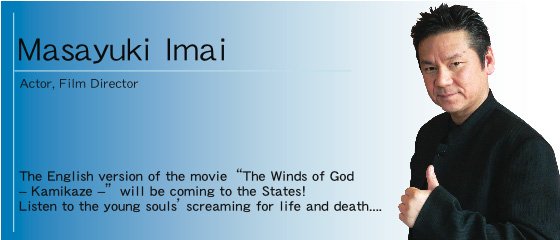 |
A not-so-successful young actor made a big decision and wrote a screenplay featuring himself. He chose the“Kamikaze”pilots of WWII as the subject matter of the story and eagerly set about reproducing the heights of their madness. While researching the Kamikaze pilots, he was stunned to realize the stereotype he held of them for so long was so wrong. They weren’t a“group of crazy suicide attackers”or“wartime motorcycle gang,”but rather a group of sorrowful young men trying to protect their parents and families in exchange for their lives. This discovery served as a turning point in his life. Out of this came the creation of the stage play,“The Winds of God,”which portrayed the state of mind of the Kamikaze pilots. Just two days after its final stage performance in Okinawa, came the shocking attacks of 9/11. Headlines across the US read,“Kamikaze Attack!”in describing the fiery crashing of airplanes into the World Trade Center buildings.“Kamikaze is not terrorism,”he asserted. Fueled by the surge of emotion, he resumed performance of the play, and even brought it to the US. The English-language movie adaptation of the play was completed in 2006 and will be released in S.D. this fall. The movie’s director / leading actor / storywriter / screenwriter is Masayuki Imai. He talks to us about how he discovered his passion for the Kamikaze. —— Can you tell us something about your childhood that defined your personality? 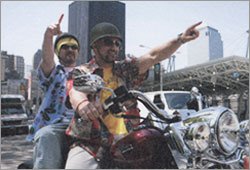
Filming on location at “Ground Zero” in New York, the first such attempt in the world.
I was a bossy kid. That’s exactly what I was. I was raised in the extreme countryside. There were only twelve kids in my elementary school class. And I was free-spirited. If the teacher told me not to play in the river, I’d make a raft and sail in the river. If the teacher told me not to go to the mountains, I’d go there to find beetles. My father, who was a member of the Self-Defense Forces, had a laissez-faire approach to childrearing. On the other hand, he always said to me, “Be punctual,” and “Never lie.” He was also strict about money. He used to say, “The meaning of 1,000 yen (approx. $8.83) is the difference between a person who has 100 million yen (approx. $882,106) and a person who only has 8,000 yen. Still, 1,000 yen is 1,000 yen.” Now I deal with hundreds of millions of yen, so I often recall what he said. —— After high school, you joined the Ground Self-Defense Force. Then you retired and entered Hosei University. That was the condition that my father laid down for my pursuing a career in show business: “First, join the Self-Defense Forces for two years.” After satisfying his condition, I said I’d start my career in the movie industry, and he said, “Next, go to college. Then you can work in showbiz.” He changed his mind. (Laughter) Then I thought, “If I cannot convince my parents of my passion for showbiz, how can I convince the whole population of Japan, 128 million people, that I am a movie star....” Loving parents want their children to live a stable life. I guess my father showed it by demanding that I join the Self-Defense Forces and go to college. “Will you really approve my showbiz career if I go to college?” I asked him. He said, “Go to one of the Tokyo Six Universities, at least.” I only had four to five months to prepare for the entrance examination. Although all I had done until then was operate a tank, I didn’t want to make that an excuse, so I decided to study very hard. It was not because I wanted to enter college, but because I wanted to get my parents’ approval. I thought I could do what I wanted if I’d pass the entrance examination. That’s the only thing I had in mind. —— We all want to be successful while doing what we really like. What do you think we need to do in order to accomplish this? 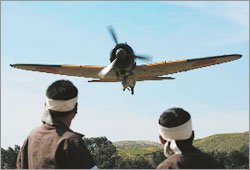
Filming a flight scene in Los Angeles with the world’s only surviving “zero” fighter in existence.
To love your job. I make a living by doing what I like. I have no obsession with money. That’s why I get ripped off sometimes. (Laughter) When I want to make a movie, that becomes the only passion for me. To make “The Winds of God – Kamikaze –,” I raised 250 million yen in five years. Theoretically, if I’d used only 100 million yen for the filmmaking and pocketed the rest, nobody would have noticed it. But, what could I do with that much money? For me, traveling by airplane or staying at a hotel itself is a luxury. I’d be happy if I ended up living in a house with a swimming pool as a result of the movie’s huge success. But I don’t make a movies in order to get a house with a swimming pool. —— Can you tell us about your movie, “The Winds of God – Kamikaze –,” which comes to San Diego this fall? You wrote and directed it, as well as played the leading role for it, right? The movie is a bit different from the original story. In the movie, American comedians living in modern New York slip back to WWII Japan after a traffic accident. They find themselves as Kamikaze pilots and when they see themselves in the mirror, they go, “Why?!” First they think they are Chinese, but later realize they are Japanese. Then they start talking about how meaningless war is. While talking about the atomic bombing of Hiroshima and Nagasaki and many other things, they feel a timeless and interracial friendship with the Japanese people. The movie also includes the concept of reincarnation. Please go see it to find out the rest. We shot the movie on location at “Ground Zero” and in Kagoshima, where the Kamikaze base was located. As for the “9/11 Ground Zero” location, we were only allowed to film there for two hours. —— “The Winds of God” has been made into a movie in 1995 a stage play and a TV movie, what made you decide to remake the movie? And, how did you decide to show the new movie here in the US? We performed the play “The Winds of God” in Okinawa on September 9, 2001. I originally planned for that to be its final performance. I had performed the play for thirteen years and had been making a living doing that, so I thought I had done enough. Also, in those days, some people had a bias against our play because the topic of Kamikaze pilots. Then, the 9/11 attack happened.... It was just two days after our “final” Okinawa performance. Of course, the event was a great shock, but even more shocking were the major US newspaper headlines reading, “Kamikaze Attack!” I was very upset. The American media identified the Kamikaze with the terrorists that attacked unarmed buildings, involving civilians. I can say this with conviction because I’ve had many occasions to interview former Kamikaze pilots: Kamikaze is not terrorism. I decided to remake the movie because I wanted to tell this to the American people. —— The language of this new movie is entirely in English. 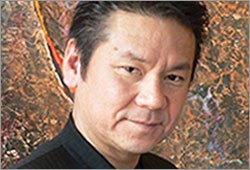
He says, “I want to pursue my career in the world as a Japanese.
Yes. Half a year after the 9/11, I flew to LA with my screenplay to have it translated into English. If you want to show a movie in the US, it must be in English. Movies with subtitles attract only those who are really interested in foreign movies. If you want to appeal to the mass market, your movie must be in English. To tell you the truth, I wanted to remake the movie as an American production, but that didn’t happen. Another thing is, everyone said the leading role must be a white person. Otherwise, the movie would not have box-office success. Americans in general are not so interested in Asian movies.... It was unfeasible to make a white man a Kamikaze pilot, but I thought it might be acceptable that Americans would slip back to WWII Japan, because the theme is human life...it’s a timeless and borderless theme. That’s why two Americans play the leading roles for the first half of the movie. Only their souls go back to their previous lives as Japanese for the other half of the movie. —— What is the main theme of “ The Winds of God – Kamikaze –”? The common theme between the play and the movie is “to live.” The death of the Kamikaze pilots paradoxically talks about it. At first, my image of the Kamikaze pilots was that they were a crazy team of pilots who were fascinated by the idea of dying as heroes. But, I realized my image of them was wrong after I started interviewing former Kamikaze pilots. I found that they’d had a great fear until the second before their sorties. By simulating death, I came to understand the meaning of life. That’s what I felt. People in my generation were born after the war. We have enjoyed economic bubbles. We have everything we need and take it for granted. We don’t have to experience bombing. We’re not going to be prosecuted if we complain to the Prime Minister. We also have the freedom to choose a job. All these are great things. I wanted to tell people about such wonderful things in life. In Iraq, the war is still going on. And, we should not forget that the greatest victims of war are always young people. —— Can you tell us about your dreams for the future? 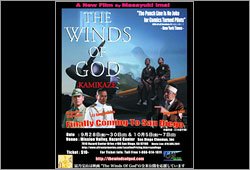
“The Winds of God – Kamikaze –” will play in San Diego from 9/28/2007 to 9/30/2007 (Fri-Sun, 1pm, 4pm and 7pm) and from 10/5/2007 to 10/7/2007 (Fri-Sun, 1pm, 4pm and 7pm) at the following location:Mission Valley, Hazard Center
San Diego Cinemas, Inc. 7510 Hazard Center Dr., #100 San Diego, CA 92108 (619) 685-2841 For questions about the movie, please contact TJS Radio (24-hour Japanese radio station) at 1-866-614-1011 (Japanese available). I’m 100% Asian, and to be honest with you, if I’d made a living by doing judo or karate, I wouldn’t have been here now. I would’ve practiced at the Kodokan for matches in the Budokan. In reality, I’m in show business. Everyone says the center of filmmaking or stage production is Hollywood or Broadway. Nobody says “Tokyo” or “Osaka.” Since I’ve chosen this profession, I’d like to aim for Hollywood, the world’s movie hub with an audience of six billion people. I want to work in Hollywood as an actor. I also want to make movies although I may not have the leading role. I have such an enormous dream. ( “The Winds of God – Kamikaze –”: Story ) On August 1st, a hot summer day, in modern New York, an unsuccessful comedy duo, Mike (American of German descent) and Kinta (half-Japanese, half-American), were fired from a live house, and are then involved in a traffic accident. When they wake up, they find themselves back in WWII Japan. It is August 1, 1945, just before the end of the Pacific War, and they are what they were in their previous lives—ka mikaze pilots for the Imperial Japanese Navy. They are stunned, facing the reality of death. Soon, they’ll be flying zero fighters, and finally the day comes.... (09-01-2007 issue) |

